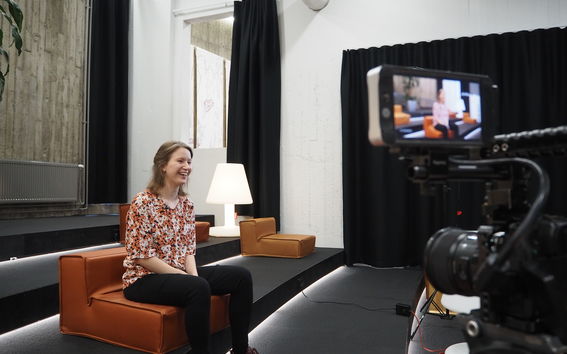Student team utilises participatory framework to develop sustainable renewal in cities

Aalto Thesis project with the City of Espoo ended at the beginning of August. Students Riia-Leena Wallin from International Design Business Management Master's programme in the School of Business and Babakolade Ojuri from Creative Sustainability Master's programme in the School of Engineering finished their theses in a shared project. Interdisciplinary results will help Espoo's urban planning centre to reach their sustainable development goals.
'The project was very well organised and guided. It had a clear structure, which was easy to follow. The team was chosen through an evaluation process, allowing us to collaborate with two motivated and skilled students,' says Johanna Palomäki, Planning Manager from the City of Espoo.
The project focused around the future of Espoo
The major challenge of Espoo is rapid population growth and its impact on the city structure. Economically, socially and ecologically sustainable solutions are essential for Espoo when planning the city.
Collaboration in Aalto Thesis programme gave the city a possibility to study the challenge from a multidisciplinary perspective. The students got to investigate how the sustainable population growth would look like in the context of Finland's second-largest city. The research was done through a case study in Sinimäki. 'The project's benefit for us was the talented pairs of helping hands in planning the Sinimäki area,' Palomäki summarises.
The project focused on evaluating the future visions of Sinimäki area. Sinimäki's building stock is mostly business premises of office buildings, some of which is underutilised. Besides the buildings, the need for renewal applies to the area's public transport, pedestrian and cycle routes, and land use planning. Sinimäki is located near Mankkaa by the Turku highway, and it suffers from noise pollution.
The project resulted in the following three most important recommendations for planning the future of Sinimäki.
Johanna Palomäki, Planning Manager, the City of EspooThe project was very well organised and guided.
1. Interactive tools for impact evaluation
The multidisciplinary student team organised together with Espoo several workshops for landowners and other stakeholders of the area. The students utilised a participatory Collaborative, Strategic, Goal-Oriented Planning (CoSGOP) framework in the workshops. The model adopts a community-based approach when sustainably regenerating and renewing urban areas. In the workshops, different stakeholder groups created hopes and visions for the desired future of Sinimäki. Wallin and Ojuri used the workshops' outcomes as their research material.
'The students did a good job in preparing the workshops mindfully and documenting the results into conclusions while utilising an appropriate theoretical framework,' Palomäki thanks.
The first recommendation is to combine interactive tools with impact assessment in the planning process. The realistic and sustainable goals developed by the stakeholders should be the city's building blocks in visioning and planning the urban area. With assessment tools' help, the city can predict environmental and social changes compared with the current status. When the city is planning the area's land-use, attention should be set especially into impact assessment of the desired futures.
2. Community-based decision-making builds trust
The second recommendation focuses on trust. Following the structure of CoSGOP model while planning urban regeneration shows the stakeholders that their wishes are heard and respected, which again increases the trust between stakeholders and the governance. Adherence to the model's steps engages the community in the change process. The CoSGOP framework includes five stages of assessment, which are the diagnosing, visioning, programming, implementing and monitoring.
'The project was neatly documented in the Master's theses and the joint summary. As an official, you might not always have time to do such work, even though documentation is important for the future. We are going to utilise the collaboration project's results in land-use and traffic planning, when the work continues in Espoo,' states Palomäki.
3. Engaging the stakeholders leads to sustainable cities
The third recommendation from the student team is about sustainable innovations. The project's results state that consulting the stakeholders actively and tight collaboration with the cities' planning and renewal work promotes innovations. Creative solutions build the base for sustainable cities.
The stakeholder groups should be engaged and heard throughout the renewal project, from the early ideation to the end's monitoring phase. This way the benefits of collaboration can be fully achieved. 'Bringing together the stakeholders and the city's experts in well-planned and structured workshops might have been the project's best outcome for us,' wonders Palomäki.
Johanna Palomäki, Planning Manager, the City of EspooWe are going to utilise the collaboration project's results in land-use and traffic planning, when the work continues in Espoo.
In addition to the student team, the academic Master's thesis supervisors and advisors play a vital role in collaboration projects.
'Academic guidance in Master's theses opens up whole new perspectives - compared to ordering the same project from a consultant, for instance. That way we would have gotten exactly what we could have known to order. In Master's theses, you don't always get what you pay for, and in my opinion, this is a great thing in development projects. New thinking, new ways of working, and new viewpoints are born,' Palomäki states.
Riia-Leena Wallin's Master's thesis advisor was Academic Researcher Toni-Matti Karjalainen. Babakolade Ojuri's Master's thesis was supervised by Assistant Professor Saija Toivonen and advised by University Lecturer Anahita Rashidfarokhi.
We are here to help.
Read more news

Join the Unite! Virtual Education Summit- Registration now open
Join us in shaping international collaboration! This online event takes place 12 March, 2026.
Apply Now: Unite! Visiting Professorships at TU Graz
TU Graz, Austria, invites experienced postdoctoral researchers to apply for two fully funded visiting professorships. The deadline for expressions of interest is 20 February 2026, and the positions will begin on 1 October 2026.
Elina Pyylampi wants to combine renewable energy solutions and commerciality
The first-year student in Electrical Power and Energy Engineering wants to work with renewable energy and electrical systems.






